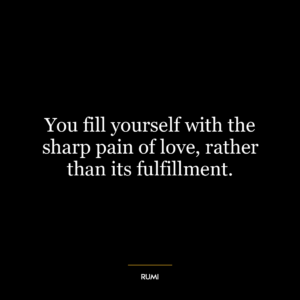this quote suggests that love is not something one can acquire through learning or effort, but rather, it arrives spontaneously and unexpectedly – as if on ‘the wings of grace’.The term ‘wings of grace’ implies a divine or heavenly intervention, a concept often associated with the idea of unmerited favor. Therefore, love is perceived as an unearned gift that descends upon us when we least expect it.
The phrase could also be interpreted to mean that love is an experience or feeling beyond our control. It’s not something we can study in a book or learn in a classroom; rather, it’s an emotion that must be experienced firsthand. Just like you cannot truly understand the beauty of flight without soaring in the sky yourself.
Applying this quote to today’s world could mean recognizing and appreciating the unexpected moments of love and kindness around us. In personal development terms, it might suggest focusing less on actively seeking love and more on cultivating openness and readiness for when love appears spontaneously.
In relationships too, this quote may serve as a reminder to let things flow naturally rather than forcing feelings or rushing into commitments. Sometiems people try so hard to find or maintain love that they end up pushing it away rather.According to Rumi’s wisdom here, allowing ourselves to be vulnerable and open might just invite genuine affection into our lives.
On another level entirely – considering current societal issues – one might interpret this quote as suggesting we need more grace (understanding) towards each other: if we approach others with kindness (love), then understanding will come naturally (‘appear’). This viewpoint encourages empathy over judgement – reminding us all how crucial it is to treat each other with compassion in these trying times.















